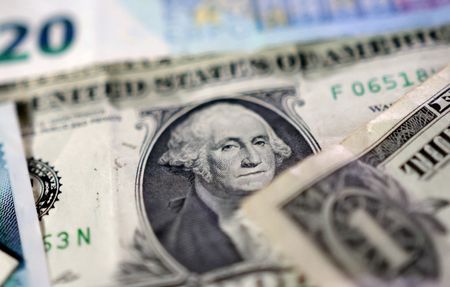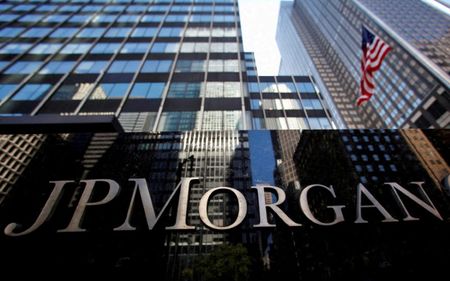By Rocky Swift, Kevin Buckland and Lucy Raitano
TOKYO (Reuters) -The U.S. dollar fell against a range of currencies on Monday, slipping to a ten-day low versus the safe-haven yen as markets digested a surprise downgrade of the U.S. government’s credit rating while trade tensions also weighed on sentiment.
Moody’s cut the United States’ top sovereign credit rating by one notch on Friday, the last of the major ratings agencies to downgrade the country, citing concerns about its growing $36 trillion debt pile.
The news saw the dollar turn lower against its major rivals following four straight winning weeks when it was boosted by rising optimism for U.S. trade deals and then a thaw in relations with China that eased fears of a global recession.
“It comes at an awkward time for the administration as it tries to get a budget through Congress by early July. It raises further legitimate questions over the deficit, safe haven status of Treasuries and the dollar,” said Kenneth Broux, head of corporate research for FX and rates at Societe Generale.
“Today is a reminder of the fragility of the dollar,” he said.
The greenback slipped as much as 0.7% to 144.665 yen – its lowest level since the first time since May 8 on Monday, meanwhile the euro was 0.73% higher at $1.1247.
China on Monday called on the United States to take responsible policy measures to maintain the stability of the international financial and economic system and safeguard the interests of investors.
It follows U.S. Treasury Secretary Scott Bessent saying in television interviews on Sunday that President Donald Trump will impose tariffs at the rate he threatened last month on trading partners that do not negotiate in “good faith.”
However, a Financial Times report that the United States had begun serious trade talks with the European Union, breaking a long deadlock, offered some hope for additional deals after Washington inked a framework agreement with Britain earlier this month.
Trump has previously said he has potential deals with India, Japan and South Korea as well, although talks with Tokyo seem to be stumbling over car tariffs.
In the market, “there’s a lot of complacency about the ability to pull off deals,” said Ray Attrill, head of FX strategy at National Australia Bank.
“Confidence that the U.S. economy is going to weather this is very much open to question.”
Sterling added 0.6% to $1.33595, with traders focused on developments in EU-UK talks.
Britain is poised to agree the most significant reset of ties with the European Union since Brexit on Monday, seeking closer collaboration on trade and defence to help grow the economy and boost security on the continent.
Trump cleared a hurdle towards passing a sweeping tax cut bill that would add an estimated $3 trillion to $5 trillion to the nation’s debt over the next decade, after winning approval from a key congressional committee.
The dollar declined 0.45% to 0.83355 Swiss franc, another safe-haven currency.
“The focus on U.S. growth risks and the U.S. administration’s policy agenda may have put the U.S. safe-haven status in question,” said Mahjabeen Zaman, head of foreign exchange research at ANZ.
Australia’s dollar was up 0.34% to $0.64255 following three days of declines ahead of Tuesday’s Reserve Bank of Australia policy announcement, with a quarter-point cut widely expected.
New Zealand’s kiwi dollar rose 0.25% to $0.58940.
(Reporting by Lucy Raitano, Rocky Swift and Kevin Buckland; Editing by Stephen Coates and Edwina Gibbs)










